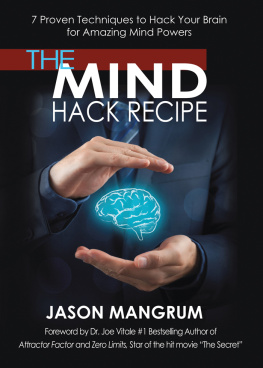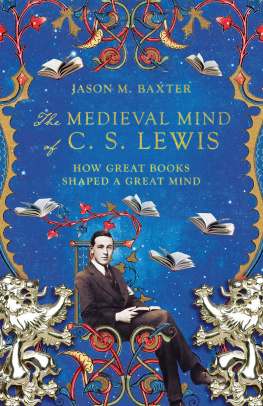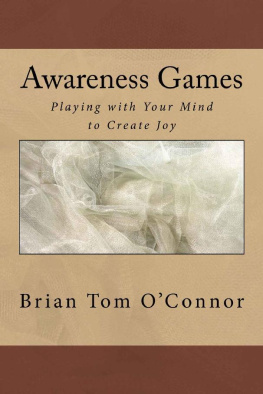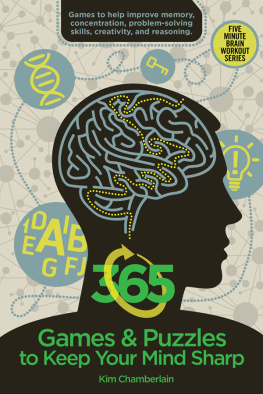Jason Rosenhouse - Games for Your Mind
Here you can read online Jason Rosenhouse - Games for Your Mind full text of the book (entire story) in english for free. Download pdf and epub, get meaning, cover and reviews about this ebook. year: 2020, publisher: Princeton University Press, genre: Religion. Description of the work, (preface) as well as reviews are available. Best literature library LitArk.com created for fans of good reading and offers a wide selection of genres:
Romance novel
Science fiction
Adventure
Detective
Science
History
Home and family
Prose
Art
Politics
Computer
Non-fiction
Religion
Business
Children
Humor
Choose a favorite category and find really read worthwhile books. Enjoy immersion in the world of imagination, feel the emotions of the characters or learn something new for yourself, make an fascinating discovery.

- Book:Games for Your Mind
- Author:
- Publisher:Princeton University Press
- Genre:
- Year:2020
- Rating:5 / 5
- Favourites:Add to favourites
- Your mark:
- 100
- 1
- 2
- 3
- 4
- 5
Games for Your Mind: summary, description and annotation
We offer to read an annotation, description, summary or preface (depends on what the author of the book "Games for Your Mind" wrote himself). If you haven't found the necessary information about the book — write in the comments, we will try to find it.
Games for Your Mind — read online for free the complete book (whole text) full work
Below is the text of the book, divided by pages. System saving the place of the last page read, allows you to conveniently read the book "Games for Your Mind" online for free, without having to search again every time where you left off. Put a bookmark, and you can go to the page where you finished reading at any time.
Font size:
Interval:
Bookmark:
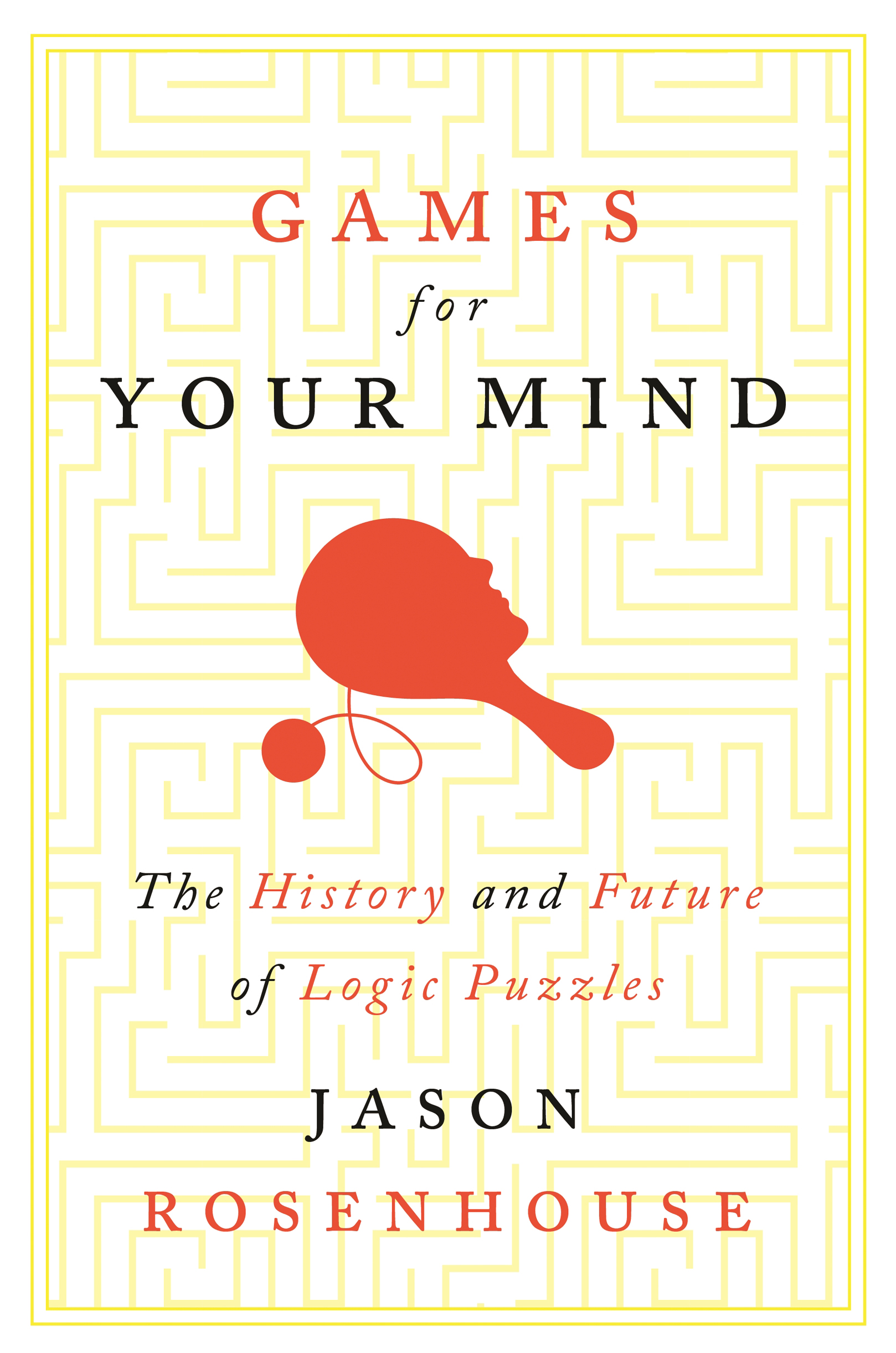
GAMES for YOUR MIND
GAMES for YOUR MIND
The History and Future of Logic Puzzles

JASON ROSENHOUSE
PRINCETON UNIVERSITY PRESS
PRINCETON & OXFORD
Copyright 2020 by Princeton University Press
Requests for permission to reproduce material from this work
should be sent to
Published by Princeton University Press
41 William Street, Princeton, New Jersey 08540
6 Oxford Street, Woodstock, Oxfordshire OX20 1TR
press.princeton.edu
All Rights Reserved
ISBN 978-0-691-17407-5
ISBN (e-book) 978-0-691-20034-7
Version 1.0
British Library Cataloging-in-Publication Data is available
Editorial: Susannah Shoemaker and Kristen Hop
Production Editorial: Brigitte Pelner
Jacket Design: Michel Vrana
Jacket Images: iStock
To Noah and Sonia
The escape room was fun.
Consider this a continuation.
- xi
Novelists often describe the experience of having their stories go in directions entirely different from what they had in mind when they sat down to write. They might create the characters and contrive a scenario for them, but from there, the characters are just going to do whatever it is in their nature to do, regardless of any preconceived notions the writer brought to the project.
To my surprise, I had a similar experience while writing this book.
My original intention had been for a relatively short, light-hearted book about puzzles. There are two towering figures in the history of recreational logicLewis Carroll (better remembered as the author of Alice in Wonderland and Through the Looking-Glass) and Raymond Smullyan. I figured I would present a selection of their puzzles with some historical and mathematical context, and then close with some puzzles based on nonclassical logics that I had devised myself.
What I had not anticipated was just how difficult it is to draw a clear line with amusing puzzles on one side, and difficult mathematical and philosophical questions on the other. Lewis Carroll explicitly integrated his puzzles into more serious, scholarly work on logic. He also published two academic papers in logic, but wrote them in the style of short stories with humorous dialog. Is that serious scholarship or merely recreational math? Raymond Smullyan saw his puzzles about knights (who always tell the truth) and knaves (who always lie) as a pedagogical tool for introducing readers to deep questions of mathematical logic, especially those surrounding Gdels two famous theorems. Meanwhile, the very idea of nonclassical logic will sound strange to many people, since it is generally thought that logic is logic and that is all there is to it. For people not immersed in this subject, the idea that logic might require an adjective to clarify the sort of logic that is intended will seem strange. (Interestingly, the spell-checker on my computer insists that logics is not a word.)
Moreover, the more I delved into the literature, the more I noticed that the puzzles I was discussing were a microcosm of the history of logic generally. Carrolls puzzles focused on the ancient system of logic pioneered by Aristotle, which dominated the subject for most of its history. Smullyans elementary puzzles explored propositional logic, which can be seen as a generalization of the Aristotelian system, while his more advanced puzzles explored the mathematical logic that supplanted Aristotle at roughly the turn from the nineteenth century to the twentieth century. Nonclassical logic has existed as a serious object of study since roughly the 1920s, but it really took off with the advent of computer science. It is a hot topic of study in the modern field of automated reasoning, which involves developing computers that can manipulate large, and sometimes contradictory, data sets.
The result was a much bigger, and hopefully much richer, book than I originally had in mind. Regardless, I have tried to write at a level that will be accessible to a general audience, while not doing too much damage to the sometimes difficult questions I found it necessary to discuss. It is almost inevitable that I have made some errors, and I am sure there are places where some philosophers will not agree with my conclusions. Hopefully, though, I have at least managed to provide some food for thought.
(Incidentally, my admission that there are likely to be some errors might seem a strange one. On one hand, I obviously think I have good reasons for believing every claim I make in the book, while on the other hand, I am acknowledging that the conjunction of all those claims is likely to be false. But if you rationally believe statements p and q individually, does that not imply you should also believe the statement p and q? This is known as the . It is one of many examples of logic puzzles arising in the most unexpected places.)
The book is structured as follows. In the first part, I provide a general introduction to both logic and logic puzzles. The second part focuses on the work of Lewis Carroll..
In closes out this part of the book with a discussion of puzzles centered around asking clever questions.
To this point, we have been discussing the history of logic puzzles. The possibilities for puzzles based on we consider a few possibilities.
employed a multivalued logic. The puzzles in this chapter are my own creations.
Finally, to refer to a category of literature in which the main interest lies in the impressive feats of logical deduction undertaken by the protagonist. Specifically, I am referring to the so-called classical detective story. These works are logic puzzles in the form of novels, and they fully deserve to be included here. I provide a brief history of the genre and also a small selection of a few of my favorite works. I hope that you will enjoy reading this as much as I enjoyed writing it.
While most of the chapters will be accessible to anyone willing to make the effort, a few will prove more challenging. Specifically, discuss fairly technical subject matter. Even here, however, I have tried to write as clearly as possible and to at least make the main ideas come through even when the details get complex or tedious.
I express my deepest gratitude to two anonymous reviewers, who made various helpful comments on earlier drafts of this book. I also thank Vickie Kearn, Susannah Shoemaker, and everyone else at Princeton University Press for their extraordinary patience and encouragement during the writing of this book. The manuscript was well over deadline by the time I handed it in, but they never pressured me to speed things up.
Let me close on a personal note. My father used to challenge me with logic puzzles when I was a kid, and I have loved them ever since. I especially remember him showing me the problem presented here as Puzzle 89 (in ), at an age where I was not yet able to make heads or tails of it. He steadfastly refused to tell me the solution, or even to give me a hint, insisting that I solve it for myself. This I eventually did, albeit years later. After completing graduate school and starting a career as a mathematician, I had the opportunity to spend a weekend with Raymond Smullyan at his home in upstate New York. I could not have asked for a more gracious host. I hope that this book will pay forward much of the pleasure and satisfaction these puzzles have, over the years, given me.
Font size:
Interval:
Bookmark:
Similar books «Games for Your Mind»
Look at similar books to Games for Your Mind. We have selected literature similar in name and meaning in the hope of providing readers with more options to find new, interesting, not yet read works.
Discussion, reviews of the book Games for Your Mind and just readers' own opinions. Leave your comments, write what you think about the work, its meaning or the main characters. Specify what exactly you liked and what you didn't like, and why you think so.

